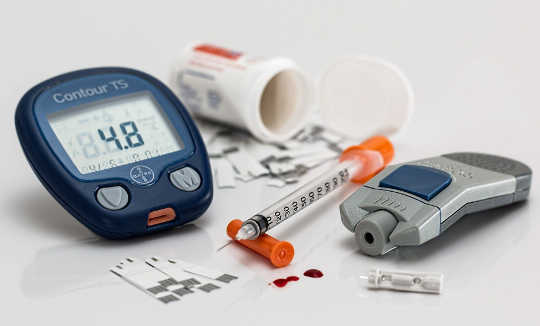
Image by Steve Buissinne
Watching another person experience diabetes influences type 2 diabetics’ self-management of blood sugar levels, according to a new study.
Throughout her 38-year nursing career, Laurel Despins has progressed from a bedside nurse and has worked in medical, surgical, and cardiac intensive care units. She noticed diabetes is rarely referred to as a primary cause of death in itself, yet the disease is a leading contributor to deaths involving heart disease, stroke, and cancer.
“In addition to being a contributor to cardiovascular-related deaths, diabetes can lead to a variety of negative health outcomes, such as kidney failure, arthritis, nerve issues, eye problems, and leg ulcers that can become infected,” says Despins, now an assistant professor and researcher in the University of Missouri Sinclair School of Nursing.
“Therefore, creating a plan to keep blood glucose levels from getting too high or too low will help those with diabetes better manage the disease and avoid those negative health complications down the road.”
Get The Latest By Email
To help adults with diabetes better manage their blood sugar levels, Despins interviewed people diagnosed with type 2 diabetes about their understanding of the disease and their approach toward self-management.
She found those who had previous life experiences watching a relative or neighbor manage diabetes influenced how they viewed diabetes management themselves.
“For example, one subject grew up watching his grandma inject insulin needles into her thigh all the time like it was no big deal, so naturally that person did not look at diabetes as something to be overly concerned about,” Despins says.
“On the other hand, another subject saw his neighbor with diabetic leg ulcers and swore that he never wanted that to happen to him, so he was very attentive to monitoring his blood sugar levels.”
To serve their patients, healthcare providers need to be aware of their financial resources, Despins says.
“People on a fixed income might not be able to routinely buy fresh produce instead of pasta, which can impact their blood glucose levels,” Despins says. “Given the tough circumstances some people with diabetes live in, health care providers need to do an assessment of what resources patients with diabetes have available so they optimize what they can do.”
Despins recommends that when health care providers collect initial quantitative data from patients such as weight, height, and age, they should also ask additional qualitative questions to get a better understanding of their knowledge of the disease.
“Asking questions like ‘What do you currently know about diabetes?’, ‘Do you know someone with diabetes?’ and ‘How do you think they did at self-managing it, and does this influence the way you view your self-management plan?’ will help the health care provider better understand the patient’s life experiences,” Despins says.
“My overall goal is to help people with diabetes better optimize their self-management, which will improve their health outcomes by avoiding negative complications in the long run.”
The study appears in the Journal of Clinical Nursing.
About the Authors
The Agency for Healthcare Research and Quality supported the work. The content is solely the responsibility of the authors and does not necessarily represent the official views of the Agency for Healthcare Research and Quality.
Source: University of Missouri
books_health







